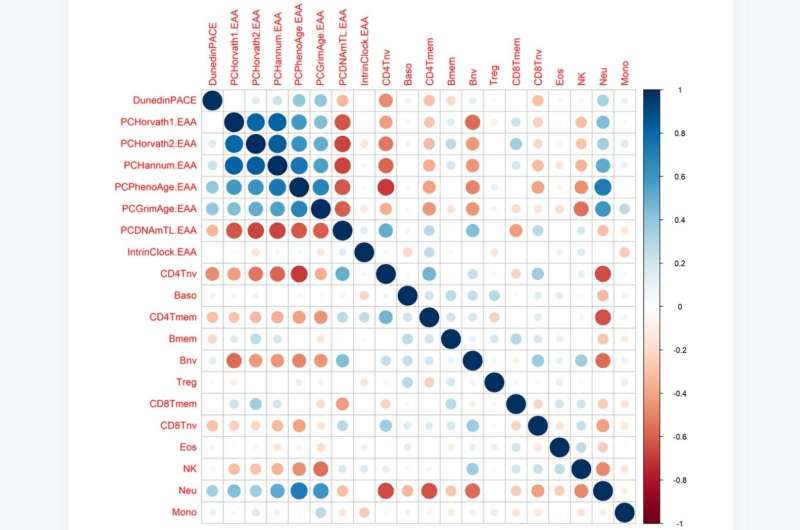This article has been reviewed according to Science X's editorial process and policies. Editors have highlighted the following attributes while ensuring the content's credibility:
fact-checked
proofread
Exploring the effects of dasatinib, quercetin, and fisetin on DNA methylation clocks

A new research paper titled "Exploring the effects of dasatinib, quercetin, and fisetin on DNA methylation clocks: a longitudinal study on senolytic interventions" has been published in Aging.
Senolytics, small molecules targeting cellular senescence, have emerged as potential therapeutics to enhance health span. However, their impact on epigenetic age remains unstudied. In this new study, researchers from the Institute For Hormonal Balance, TruDiagnostic, Buck Institute for Research on Aging, and Cornell University aimed to assess the effects of senolytic treatments on DNA methylation (DNAm), epigenetic age, and immune cell subsets.
The researchers write, "[...] this study aims to comprehensively assess the impact of senolytic drugs on epigenetic aging through two longitudinal studies to address our research objective. The initial investigation focuses on a combination treatment of dasatinib and quercetin, while the subsequent phase incorporates fisetin into the treatment regimen."
In a Phase I pilot study, 19 participants received dasatinib and quercetin (DQ) for 6 months, with DNAm measured at baseline, 3 months, and 6 months. Significant increases in epigenetic age acceleration were observed in first-generation epigenetic clocks and mitotic clocks at 3 and 6 months, along with a notable decrease in telomere length. However, no significant differences were observed in second and third-generation clocks.
Building upon these findings, a subsequent investigation evaluated the combination of DQ with fisetin (DQF), a well-known antioxidant and antiaging senolytic molecule. After one year, 19 participants (including 10 from the initial study) received DQF for 6 months, with DNAm assessed at baseline and 6 months. Remarkably, the addition of fisetin to the treatment resulted in non-significant increases in epigenetic age acceleration, suggesting a potential mitigating effect of fisetin on the impact of DQ on epigenetic aging.
"Furthermore, our analyses unveiled notable differences in immune cell proportions between the DQ and DQF treatment groups, providing a biological basis for the divergent patterns observed in the evolution of epigenetic clocks. These findings warrant further research to validate and comprehensively understand the implications of these combined interventions," the researchers add.
More information: Edwin Lee et al, Exploring the effects of Dasatinib, Quercetin, and Fisetin on DNA methylation clocks: a longitudinal study on senolytic interventions, Aging (2024). DOI: 10.18632/aging.205581




















